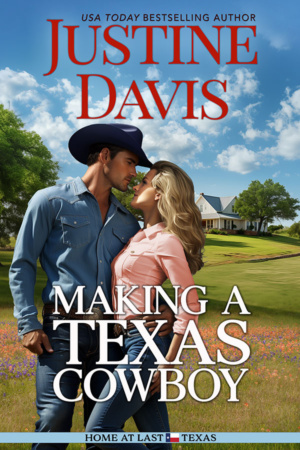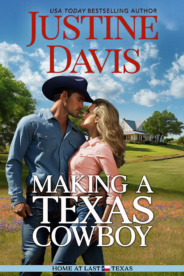Start reading this book:

Share This Excerpt
Chapter One
They’d made it nearly an hour this time before somebody recognized him.
Jackson Thorpe let out a suppressed sigh as he watched his son, Jeremy, playing in the sand. Well, not exactly playing, although there were toys beside him. The seven-year-old spent more time simply grabbing fistfuls of sand and letting them spill out through his fingers.
Watching life slip away . . .
He couldn’t seem to rid his mind of the thought he’d had the first time he’d seen Jeremy endlessly watching those grains of sand slip out of his grasp.
Bringing the boy to the beach on this New Year’s Day had been a desperate grab for something, anything that would give him hope things would improve. Jeremy had always loved the beach, so much that his mother brought him here every chance she got. And he’d hoped that the winter holiday would mean fewer people there. No such luck.
But then his luck had run out two years ago.
He bit his lip, hard, trying to stop the stinging tears that wanted to form.
Leah, I don’t know what to do.
God, he missed her. Missed her smile, her laugh, that wisdom that had been so amazing for a woman still in her twenties. He had a couple of years on her, and was nowhere near as smart about people, especially their son. She was the same in his thoughts as she’d been then, teasing him about being an old man at thirty. She was frozen in his mind, just as she’d been at twenty-nine.
Because she never saw thirty.
“Jackson!”
“Mr. Thorpe!”
“It’s Austin Holt!”
He smothered a sigh at that last shout of the too-familiar name from the growing cluster of people, some paparazzi, some apparent fans, some just beachgoers wondering what the fuss was, trying to clamber over the rocks to get to them. Every beach in California was technically public up to the mean high tide line, but this little one in front of Miles Flint’s place was exceptionally hard to get to under that rule, protected by the rocks that jutted far out into the water on one side, and a cliff with a sheer drop of over fifty feet on the other. Because of that, many of his friends—including the star of his latest television series that had become one of those soaring, engulfing things that had taken over most of the country—used it. Because his friends were the kind of people who treasured what was hardest for them to get: privacy.
You’ve hit the big time, Jackson, and now you’re going to see the downside. You won’t be able to sneeze without somebody getting it on video and spreading it far and wide, usually with lies attached.
He’d thought Miles was exaggerating, at the time. But the successful producer had been generous with his offer to come here anytime, and Jackson had gladly taken him up on it, for his family’s sake. Of course, the fact that Stonewall had paid for a big chunk of this piece of high-end real estate probably made it an equitable trade. Miles had taken the chance of casting an unknown with no real experience in a modern-day western, and it had paid off a thousandfold when the show had shattered just about every broadcast and streaming record there was. Miles—and he, himself—had been riding high on the kind of wave only hitting the zeitgeist of the culture at the right time with the right story could create. They had—
“Is that Jeremy?”
The shout in a shrill female voice jolted him out of his reverie. That was it. The recognition of him was one thing, and part of the job. He’d always thought those who pretended not to want it, even as they made sure they got it, were the worst sort of phony. But when it came to his son, especially now, every considerable protective instinct he had kicked into overdrive at the slightest hint of intrusion into the boy’s seemingly bottomless grief.
He didn’t wait for the boy to get up and walk back to the house with him. He simply picked him up and took him. And tried not to wince at how light he was. He should weigh about fifty pounds by now, and Jackson knew he didn’t. Knew he’d lost weight when he should be gaining it rapidly. But every meal was a battle, albeit a very quiet one. Because just like now, when he’d picked him up, Jeremy didn’t fight, didn’t argue, didn’t pitch a fit. He just sat there and wouldn’t eat. Even things he’d gobbled down like a starving dog before.
He put the boy down once they were inside. Watched as his son sat on the couch, not the one facing the wall of windows looking out at the water, but on the one facing the fireplace wall, with the big painting of the place that had inspired Stonewall. The sprawling hills covered with bluebonnets in full bloom was a bright, colorful thing, although Jackson knew the color was transitory because the flowers only lasted about a month.
Miles had told him he’d had the painting for a couple of years before the idea of telling a story about it had occurred to him. He’d often talked about it in interviews. Which had been frequent after he’d become the hottest creator in Hollywood when the show had blasted through the summer doldrums to become the biggest thing going five years ago. Carrying Jackson along with it, taking him from a guy wrangling horses and scrounging for bit parts, to the flavor of the month. That month had become a year, that year two, then more, until he’d grown sick of seeing his own face everywhere.
Before he’d lost the only anchor that had kept him sane and grounded. Before the accident that had ended the life they’d built, the only life his son had ever known. The son who now sat in what had become his usual silence, just staring at the painting he wasn’t even sure the boy was seeing at all.
With an effort that never seemed to get any easier, he pulled his mind out of that ugly rut. He went to the kitchen and grabbed a couple of the candy bars Jeremy had always loved, figuring at least there were nuts in it that would provide some nutrition. He walked back to the living room and sat beside him on the couch. He tossed one of the bars at his son and proceeded to unwrap the other himself, hoping the boy would just follow suit. He took a bite, making himself look at the painting and not Jeremy. It did taste good, although he didn’t indulge often.
After a moment he heard the tearing of another wrapper, and he dared to hope it had worked.
“Funny how that painting inspired Stonewall,” he said, still without looking at Jeremy. “Miles was just sitting here one night, just like we are, looking at it, and started asking himself questions about it. ‘What ifs,’ he called them. What if there was a ranch there, what if it was a family ranch, what if the guy who owned it had never expected to? What if, what if, what if?”
Jeremy said nothing, but Jackson caught out of the corner of his eye that the boy had taken a bite. He waited until he’d swallowed before trying to draw him into a conversation, an effort that was usually met with words of one syllable, or a shrug and no words at all.
He finally looked at his son. “What would you ask?”
He’d about resigned himself to the usual no answer when Jeremy said, very quietly, “What if it was real?”
Jackson froze. Five whole words. And an actual answer, not simply a variation on “Nothing,” or “Leave me alone.” It took him a moment of near-frantic thinking to decide how to respond. The only thing he was sure of was that it had to be normal, sound normal, as if this wasn’t the first time since that awful day the boy had actually participated in a conversation.
“The place in the painting?” he asked, hoping more questions would keep it going.
“The ranch. I wish the ranch was real.”
He was talking. He was actually talking. Jackson had to steady himself to go on. “The ranch . . . from the show?” Jeremy nodded. “You mean in Texas?” Another nod. Jackson held his breath for a moment before he finally asked, “Why?”
The boy shrugged, and Jackson resigned himself to the end of the conversation, but still counting it a win because the boy had actually communicated. But then Jeremy spoke again. “Because then we could go live there. For real. Not just you pretending.”
Jackson had never felt this before, this sensation that everything, absolutely everything, depended on what he said next. A crucial scene where he had to deliver a killer line had never, ever mattered as much as this did.
“Well, that place”—he gestured at the painting—“is real. It doesn’t always look like that, with the flowers, but it’s real. In fact, it’s not far from where your aunt Trista lives.”
For the first time Jeremy turned to look at him. “It is?”
He nodded, since the boy was looking at him now. “In fact, I’ve been thinking we should go see her. She’s really sad, missing your uncle David. You know how bad that feels. Maybe we could all make each other feel better.”
“She still remembers him?”
It had been two years longer for Trista, but there wasn’t a doubt in Jackson’s mind she had adored her husband with everything in her. “Yes. She thinks about him every day.”
Jeremy looked down, apparently fascinated by a bit of sand clinging to his knee. Finally, barely above a whisper, he asked, “Will I remember Mom?”
It was like a knife to the gut for Jackson. He had no idea this was bothering the boy. He slid off the couch and swung around to kneel in front of his son.
“You will never, ever forget her, Jeremy. It’s just that someday you’ll be able to think about her and it won’t hurt as much as it does now.”
“Does it hurt you?”
“More than anything in my life.”
Except the thought that I’m losing you too.
He hoped that this, the most his son had spoken since the day he’d had to tell him Mom wasn’t ever coming home, marked a turning point.
As it turned out, in a way, it had.
His son shut down even more. Completely.
And Jackson Thorpe, the man who pretended in front of cameras to be the guy with all the answers, the ruler of a small kingdom in the state that had once been its own country, had no answer for this.
He woke with a start. Realized he was on the floor. Couldn’t remember how he got there. He raised his head. Blinked, trying to see in the darkness of the room. When he recognized where he was, on the floor in the living room at home, in front of the couch, it all came rushing back. The waiting for the nosy ones to give up before putting Jeremy in the car and leaving Miles’s place for home, although it didn’t feel like that anymore. Getting there, and Jeremy assuming the same position he had at the beach, staring at seemingly nothing. Himself, determined to get the boy talking again, like he had in those moments in front of that painting.
Determined, and failing.
He sat up hurriedly, but carefully; he didn’t want to make a noise that might wake the boy sleeping on the couch.
There had been a time when, waking up on the floor, he would have assumed he’d passed out drunk. But no more. That month-long binge after Leah died was both the first and last of his life. Thanks to his sister, who had flown to California to confront him after his best friend, Tucker, had called her in concern. She’d arrived at the house to find him face down in the bathroom after having nearly puked his guts out. Knowing him all too well, she took video of the scene, then of Jeremy huddled in a corner of his room, saying he “tried to take care of Daddy,” and finished it off with his own vicious rant as he woke up, realized she was there and what she was doing.
She’d made him watch the video, and when he looked into his son’s eyes, saw how broken he looked, he knew he’d reached the end of this little experiment that hadn’t worked, anyway. A few hours of oblivion was not worth that look on an already broken-hearted five-year-old’s face. And he went back to his old habits, which involved nothing more than an occasional drink on special occasions.
He sat there silently, propped up against the coffee table, looking at the boy curled up in an almost fetal position, hands clenched even in sleep around the knitted blanket Jackson had put over him last night. The throw his mother had made for him, with the image of his favorite creature, a roadrunner, worked into it. He stared at the whimsical design, remembering how it was that very thing about Leah, her sense of whimsy, that had kept him sane and at least somewhat balanced when the rocket that was Stonewall had first taken off.
After Tris had brutally awakened him to the additional damage he was doing to an already devastated child, he’d done everything he could think of. He’d taken more time off to be with Jeremy, with the producers’ understanding, even as it screwed up their schedule for the rest of the year. He’d found a doctor with a stellar reputation for dealing with bereavement in children and followed every suggestion the woman gave after her sessions with his son. Nothing had helped.
In a crazy way Jeremy’s desperate state had muffled his own grief over losing Leah; he was so terrified he was going to lose their child, too, that he doubted his brain had fully processed the actual loss.
When he’d gone back to work, he’d frequently had the boy visit on the days they were filming exteriors because he seemed to like it when they were outside with the animals—cows, horses, and a couple of well-trained acting dogs. Jeremy had gone, but silently. He’d petted the horses, the dogs, even a calf or two. Then he’d hidden out in Jackson’s trailer, refusing to come out, huddling on the bunk in the back so much like he’d been in that video that it made Jackson more than a little queasy.
Like he was huddled on the couch now.
He stared at the boy.
I wish the ranch was real.
He grabbed the phone he’d tossed on the chair he’d vacated to take this spot closer to his son. Glanced at the time. Five a.m. here. That would make it seven a.m. for Tris. Which would mean she’d probably been up for at least an hour, probably more. She hadn’t slept well since David’s death.
And you didn’t understand . . . then.
But he did now. And so would Tris.
He stared unseeingly at the phone. He knew what would happen if he did this. He’d be screwing over the crew, which he hated. He’d be aggravating the producers, including Miles, but also Felix, which he hated a little less. The arrogant jerk deserved a bit of aggravation. He’d probably go after him legally, eventually, so there was that. He also might be killing the show altogether, and he didn’t like that either.
But he loved his son.
He made the call.
Chapter Two
“You did what?”
Finished pouring her own glass of wine, Trista offered him one, but he shook his head. “You put the fear of alcohol in me for good with that video.”
“That was the plan,” she said.
“Testing me?”
“Part of my job as the big sister.”
She instead got him a bottle of sweet tea from the fridge and handed it over.
“Now,” she said, “back to my question. You did what?”
He studied the bottle in his hands. “I walked out.”
“Let me be clear on this. You quit the show?”
“That’s up to them. I just told them I was leaving, and I didn’t know when I’d be back.”
“You walked away from the biggest television show in the country and half the world, the show that made you? That won you all those awards that clutter up your bookshelves?”
His head came up. “I thought you hated it.”
“I hate how fake the Texas parts are,” she corrected. “I love your success. You deserve it, bro. You’re really good.” She gave him a crooked grin. “I never really realized before how good you were, until you had me forgetting you were my brother, not this guy who doesn’t exist.”
He gave a half shrug. “He’s a lot tougher than I am.”
“But you make it believable.” She studied him for a long, silent moment before saying, “You know most of the world will think you’re crazy, walking away from a show that big.”
He met her gaze, looked into her familiar, always loving eyes. Eyes so like his own, the deep blue of their father. It had been a standing mock argument in their family when they were growing up, whether the eyes looked better with his dark hair or her auburn. Each of them had always voted for the other.
“I had to leave, Tris. I was losing Jeremy. He’s more important than anything else.”
Her eyes took on a sudden sheen, and she blinked rapidly a couple of times. “Yes. Yes, he is.”
He knew she understood. She and David had not, sadly, had any children, but she understood. “He makes it all both better and worse, doesn’t he?” she asked softly.
He remembered his own earlier thought. Leave it to his brilliant sister to distill it down to the essence. “Yes.”
She sipped at her wine, pushed a strand of hair that had fallen forward behind her ear, then glanced toward the hallway entrance. There, two doors down, his son slept—hopefully—in the foldout cot in the room that usually served as his sister’s office. They’d had a discussion about this, and it had been Tris who’d suggested that instead of putting the boy on the sofa out here where he had usually slept when they visited—when Leah had been alive—they share the room.
“I just think he needs to know you won’t leave him too,” she’d said, giving him yet another glimpse into the mind of a kid who wasn’t quite old enough to completely understand the concept of death. As a teacher, Tris had more than once dealt with a child in Jeremy’s position.
Even as he thought it, she asked a very teacher-like question. “Pulling Jeremy out of school like that . . . aren’t you afraid that will mess him up more?”
“I’m not sure he could be messed up more,” he admitted.
“Then we’ve got a job ahead of us,” she said, calmly.
Again, he felt the stirring of regret that she and David hadn’t had children. Then felt bad for that feeling, because it would put his sister in the same shoes he was in, that of a person grieving their so very much loved spouse and striving to keep their equally beloved child from strangling in the clutches of their own grief. Even if he didn’t fully understand it, Jeremy knew his mother was gone. And it had been Tris who had warned him that the boy might find a reason to blame himself, which was exactly what had happened. Jackson had spent a long, sad night holding his son and assuring him that him scaring his mom with his new slingshot glider hadn’t made her so mad at him, she’d left.
“How did you do it?” he asked bleakly. “How did you get past losing David?”
She set her glass down and stared at him. “What makes you think I have?”
He knew he’d made a big mistake. “I’m sorry, I didn’t—”
“You think because I get up and go to work every day, I’m past it? You think because I’m functional, I’m past it? Well, stick around, brother mine, and you’ll see what a mess I still am. If you hear me crying in the dark, ignore it. If you see me wearing his shirt, ignore it. If you—”
Jackson got to his feet and pulled his sister up out of her chair. He enveloped her in a hug, squeezing as tightly as he thought he could without actually hurting her.
“I’m an idiot, Tris. You already know that, but in case you’d forgotten, that was my latest reminder.”
He felt her sigh against him, and finally she hugged him back. “I think it’s in the brother’s job description.”
“Wish I wasn’t so good at it.”
He heard, muffled against his chest, the familiar laugh. “And that is why I love you, Jackson Thorpe. You’ve never let it all go to your head, when you easily could have.”
“Maybe that’s because I know damned well I just happened to be doing the right thing in the right place at the right time.”
“Three rights don’t make a wrong, you know.”
He leaned back, gave her a wry grin. “Four rights. I forgot to add that it was in front of the right person.”
“Some people would see that as meant to be.”
“In my world, most would see it as sheer dumb luck.”
“I know. One of the things I don’t like about your world.”
“One of the many,” he said, knowing his sister did not have the highest opinion of his line of work.
She backed away far enough to give him the determined look he knew so well. “But I’m proud of you,” she said with that Tris-like adamance that had been in her voice ever since he’d been old enough to understand when she was defending him.
“And I you, sis. You handled this much better than I have.”
“You have Jeremy to worry about too. And like I said, I’m not past losing David any more than you’re past losing Leah.”
“We’re a couple of miserable ones, aren’t we?”
Her expression changed then, gentled. “But we had something many people are never lucky enough to have. Someone to love completely, and who loved us the same way.”
He had to swallow, and it was tight, before he could get out a single word. “Yeah.”
“Now,” she said with that finality that warned him she was about to start organizing. “I think we should take a drive tomorrow, so Jeremy can see a bit of the countryside, then head into town for lunch and a walking tour of Last Stand.”
He sighed. “As long as you know he’s likely to not be interested. He hasn’t been interested in anything. The shrink he was seeing said he’d never had a tougher case.”
She looked thoughtful. “Perhaps he’s starting to realize never means never.”
“As in his mother’s never coming back? Yeah, I think he is. He asked me the other day if he would forget her. The longest conversation we’ve had in months.”
“Did you tell him he never would?”
“I did. But that’s one reason we came. I thought he should be around someone who never has.”
He’d never seen so much pain and love combined as he saw then in his sister’s eyes. She and David had both fought his illness so hard, only to lose the battle seven years ago. Jackson knew how devastated she’d been at his death, and how hard she’d fought to simply keep going. She’d had every reason in the world to disconnect, but she never stopped trying to function.
He wasn’t sure he had her grit. He wondered if he’d still be mired in this grief in five more years.
“I’m glad you came,” Tris said. “Maybe I can make up a little for being so lost when he was born.”
He didn’t know what to say to that. So instead he hugged her again.
End of Excerpt










